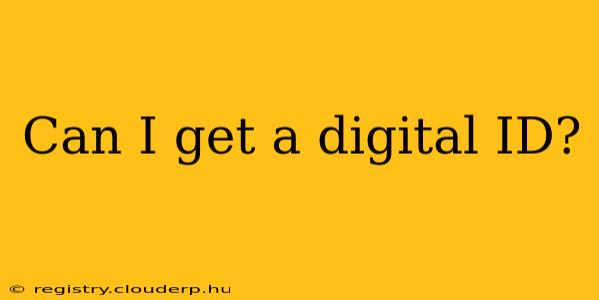Can I Get a Digital ID? Navigating the World of Digital Identities
The question of whether you can get a digital ID is a resounding "yes," but the specifics depend heavily on your location and the type of digital identity you're seeking. Digital IDs are becoming increasingly prevalent, offering a secure and convenient way to prove your identity online and in the physical world. However, the landscape is complex, with varying levels of adoption and different implementations across countries and regions.
This guide explores the possibilities, challenges, and future trends surrounding digital identification.
What is a Digital ID?
A digital ID, or digital identity, is a virtual representation of your identity, typically containing verifiable information such as your name, date of birth, and potentially other personal data like address and biometric information. It allows you to prove who you are online or in person without needing to physically present documents. Think of it as a virtual driver's license or passport, accessible through your smartphone or other device.
What are the different types of digital IDs?
Several types of digital IDs exist, each with unique features and applications:
- Government-issued digital IDs: These are often integrated with national identity systems and provide a high level of security and verification. Examples include the UK's Gov.uk Verify or similar initiatives in other countries. These IDs often require rigorous verification processes.
- Mobile driver's licenses: Many jurisdictions now offer digital versions of driver's licenses, stored securely on your smartphone and accessible for verification by law enforcement or businesses.
- Company-specific digital IDs: Some organizations issue digital IDs to their employees for access to internal systems and resources. These are usually tied to specific company networks.
- Decentralized digital identities: Emerging technologies like blockchain and decentralized identifiers (DIDs) offer a new approach to digital IDs, promising greater user control and privacy. These are still under development but hold significant potential for the future.
How can I get a government-issued digital ID?
The process for obtaining a government-issued digital ID varies significantly by country. In some places, it may be automatically linked to your existing national ID, while in others, you may need to apply online or through a government agency. It’s crucial to check your local government's website for specific instructions and requirements.
What are the benefits of a digital ID?
Digital IDs offer a range of benefits:
- Convenience: Access services and prove your identity quickly and easily from your smartphone.
- Security: Many digital ID systems incorporate advanced security features to prevent fraud and identity theft.
- Efficiency: Streamline processes that previously required physical documents, leading to faster transactions and reduced bureaucracy.
- Improved accessibility: Digital IDs can make it easier for people who may have difficulty accessing physical documents to participate in online activities.
What are the privacy concerns surrounding digital IDs?
While offering considerable benefits, digital IDs also raise valid privacy concerns:
- Data security: The security of the data held within a digital ID system is paramount. Breaches could lead to significant identity theft.
- Data usage: Clear guidelines are needed on how the data stored in digital IDs will be used and shared. Transparency and user consent are crucial.
- Government surveillance: There are concerns about potential government overreach in using digital ID data for surveillance purposes.
Are digital IDs secure?
The security of a digital ID depends heavily on its design and implementation. Well-designed systems utilize advanced security protocols like encryption and biometric authentication to protect user data. However, no system is completely impenetrable, and ongoing vigilance is needed to address potential vulnerabilities.
What is the future of digital IDs?
The future of digital IDs points towards increased adoption, integration with other technologies, and greater user control over their personal data. We can expect to see greater interoperability between different digital ID systems, enabling seamless identity verification across various platforms and jurisdictions. The development of decentralized digital identity solutions is also likely to play a significant role in shaping the future landscape.
This information is for general guidance only. For specific details on obtaining a digital ID, consult your local government or relevant authorities.

